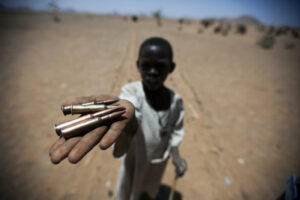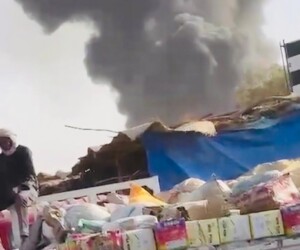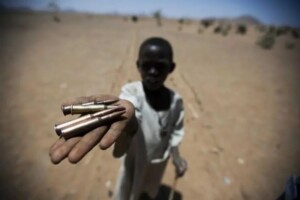Start of investigations on Sudan’s June 3 Massacre with members of Sovereign Council
Yesterday, an independent national commission started its in-person investigation on the violent dispersal by government forces of the protesters at the sit-in in front of the Sudanese army’s General Command in Khartoum on June 3, 2019, causing the death of at least 127 demonstrators. The commission began by questioning members of the military component of the Sovereign Council.
 Vigil in August this year to remember Sudanese protestors who went missing following a violent crackdown in Khartoum on June 3 last year (Social media)
Vigil in August this year to remember Sudanese protestors who went missing following a violent crackdown in Khartoum on June 3 last year (Social media)
Yesterday, the independent national commission of inquiry into the violent dispersal of protesters at the sit-in in front of the Sudanese army command in Khartoum on June 3, 2019, causing the death of at least 127 demonstrators, started its in-person questioning of the military members of the Sovereign Council.
Headed by prominent lawyer and human rights defender Nabil Adib, the commission questioned Lt Gen Yasir El Ata, member of the Sovereignty Council, for two hours in the presence of leading members of the commission.
The commission was formed in September 2019 on the request of PM Abdallah Hamdok. In October, the names of the committee members were announced, and investigations started.
Though the work of the commission has been delayed because of the coronavirus lockdown in the country, earlier this year, the testimonies of more than 3,000 witnesses have been heard so far. The about 150 video recordings the committee received from protestors and other people present at the sit-in on June 3, are still being studied.
Lt Gen Shamseldin Kabashi, member of the Council and former member of the Transitional Military Council ruling Sudan at the time of the massacre, has reportedly already been summoned as well.
Court cases
Sudan’s Chief Justice and veteran Sudanese Supreme Court Judge Nemat Abdallah confirmed that the cases of three killed protestors, Ahmed El Kheir, Hanafi Abdelshakour, and Ashraf El Tayeb, have been brought to court.
In her address to protestors in front of the judicial authority, who included the families of martyrs and dozens of Resistance Committees and activists, she said that she had supervised the formation of special court constellation composed of the best judges in the country to try those accused of killing the martyrs.
The families demanded the Special Courts for Martyrs’ Cases to speed up the remaining investigations and trials. They explained that the Public Prosecutor informed them that the reason for the delay in trials was because the authorities did not cooperate in lifting the immunities of the accused.
Last month, the father of Abdelsalam Kasha, a protestor killed during the uprising, denounced “immunity enjoyed by the government forces,” explaining that “it hinders retribution and is devoted to impunity”.
Another reason for the delays is the fact that Attorney General Tajelsir El Hibir suspended and detained multiple public prosecutors after they submitted a memorandum to the Sovereign Council accusing El Hibir of committing “grave breaches that amount to criminal offences” and demanding his resignation.
Among the suspended and detained prosecutors were those dealing with the most important prosecution files, including cases of the June 3 Massacre.
Abdallah explained that she had not yet received any of the cases of the martyrs from the June sit-in or any cases related to crimes and violations in Darfur and South Kordofan.
She did explain that the case of Ahmed El Kheir has reached the Supreme Court after passing the Court of Appeal and is one enforcement away from a final verdict.
The mother of El Fateh El Nimeir, “martyr number 16”, said that the people accused of killing her son have not been handed over by the security appartus and that their immunity has not been lifted.
Representatives of the December Revolution also addressed the protestors, explaining that their cases are still pending.
June 3 Massacre
On April 6, 2019, protestors staged a sit-in in Khartoum to pressure the then ruling dictator Omar Al Bashir to step down. Five days later, the dictator was deposed in a military coup. The protestors, however, continued occupying the space in front of the Defence Ministry, calling on the military to hand over power to a civilian government.
Two months later, on June 3, the people at the sit-in were attacked by government forces. The attacks cost the life of 127 demonstrators and bout 700 protesters and others present at the sit-in that day were injured. More than 100 people went missing.
According to medics, 83 per cent of the victims of the revolution were killed after the ousting of Al Bashir on April 11.
An investigation report of the Sudanese Archive and the Human Rights Center Investigation Lab UC Berkeley states that the Rapid Support Forces (RSF) and other security forces are responsible for the violent dispersal of sit-ins across Khartoum.
This year, Sudan’s Prime Minister Abdallah Hamdok called the June 3 massacre “a criminal act against the Sudanese people for which the perpetrators must be held accountable”.
Course correction
This Saturday marked the second anniversary of the December 2018 revolution. During marches and celebrations, people demanded the correction of the course of the revolution.
In a forum of the Sudan News Agency (SUNA), El Sir Kasha, representative of the Association of the December Revolution Martyrs’ Families, called for the committee investigating June 3 Massacre to publish its results. “The perpetrators should be immediately brought to justice”, he urged.
“The streets do not betray,” Kasha said. “The revolution has deviated from its course and corrections must be made.”
He called for a mandate of the revolution’s government over state resources, and the establishment of a Legislative Council without partisan quotas.
This year, the Teachers Union also demanded the correction of the course of the revolution, along with the Association of the December Revolution Martyrs’ Families.
Radio Dabanga’s editorial independence means that we can continue to provide factual updates about political developments to Sudanese and international actors, educate people about how to avoid outbreaks of infectious diseases, and provide a window to the world for those in all corners of Sudan. Support Radio Dabanga for as little as €2.50, the equivalent of a cup of coffee.












 and then
and then